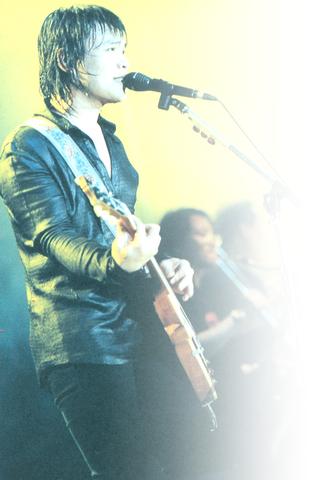"I pursue light and heat. I like this kind of beautiful lavish life. So I push myself, burn myself, and see how far I can go." So writes Taiwan's star rocker Wu Bai (伍
After starring in last year's action movie Time and Tide, Wu Bai, also dubbed the King of Live Concerts, has taken a break from recording and touring to focus instead on the biography-cum-photo album retrospective which documents his rise to stardom during his 10-year music career.
With his trademark black dress, unmistakable helmet hair, powerful blues rock and lyrics in Taiwanese, Wu was the first to popularize live rock performances in Taiwan, drawing crowds of up to 100,000 and generating record sales of more than 600,000 copies for his most popular albums.

PHOTO COURTESY OF CITE
In Moonlight Symphony, Wu and a host of coauthors bring across the explosive energy of his live performances with colorful photo spreads and provide some valuable insight into the Wu Bai phenomenon by re-publishing articles written by music critics, record company managers and cultural critics. The image created is of a fiercely charismatic artist who hit all the right notes in trying to bring about his own success.
Born in 1968 in a town called Garlic Village in Chiayi County, Wu was a typical country boy who packed off to Taipei at 19 with a guitar and ambition. Once in the big city, his wild, unrestrained character quickly caught people's eye. "When I heard his demo tape, the first thought that came to mind was the word `energy,'" said Ren Chiang-ta (
Despite his obvious charm and energy, Wu's first album, released in 1992, saw disappointing sales. "We realized his music was far removed from the mainstream market. At that time, people still weren't going to live houses to listen to music," writes Ni Chung-hua (倪重華) owner of Mandala music, Wu's record company that time, and a contributor to Moonlight Symphony. The music industry back then was even more dominated by pretty-faced idols singing syrupy love ballads than it is currently.
"So we arranged for him to sing at a pub called Shijang (
Wu did not linger long in the underground music scene. His aim from the beginning was to edge his way into the pop music mainstream, but with his own music.
His blues rock melodies tinged with uniquely Taiwanese influences such as local puppet theater (
"Many voices of my environment come out in my music. They could be really cool tunes, or cheesy pop ballads, but they are part of my society, part of my life. But I always want to maintain a certain kind of attitude toward music. If the attitude is there, then whatever I wear, whatever I sing, I'm still being myself," Wu said in an interview.
Wu has even taken his brand of Taiwanese rebel rock overseas. In a press conference prior to his first concert in Hong Kong's Hom Hum Stadium, in 1999, Wu told reporters "I don't care if tickets sell well or not, I will sing. I don't care if you understand Taiwanese or not, I will sing. And I don't care the stadium regulations, I want [the audience] to stand up, sing and dance with me,"
"He has a rebellious and romantic spirit," said Hong Kong director Tsui Hark (徐克) during an interview at the Cannes Film Festival in May. Wu starred in Tsui's movie Time and Tide and the director said he plans to work with Wu again in his next action film.
Wu will bring his charisma back to Taipei to his old stomping ground @live on July 27. According to his record company, Magic Stone, almost two thirds of the tickets have already sold out. Wu's new album is scheduled to be released in November.

“Why does Taiwan identity decline?”a group of researchers lead by University of Nevada political scientist Austin Wang (王宏恩) asked in a recent paper. After all, it is not difficult to explain the rise in Taiwanese identity after the early 1990s. But no model predicted its decline during the 2016-2018 period, they say. After testing various alternative explanations, Wang et al argue that the fall-off in Taiwanese identity during that period is related to voter hedging based on the performance of the Democratic Progressive Party (DPP). Since the DPP is perceived as the guardian of Taiwan identity, when it performs well,

The Taiwan People’s Party (TPP) on May 18 held a rally in Taichung to mark the anniversary of President William Lai’s (賴清德) inauguration on May 20. The title of the rally could be loosely translated to “May 18 recall fraudulent goods” (518退貨ㄌㄨㄚˋ!). Unlike in English, where the terms are the same, “recall” (退貨) in this context refers to product recalls due to damaged, defective or fraudulent merchandise, not the political recalls (罷免) currently dominating the headlines. I attended the rally to determine if the impression was correct that the TPP under party Chairman Huang Kuo-Chang (黃國昌) had little of a

At Computex 2025, Nvidia CEO Jensen Huang (黃仁勳) urged the government to subsidize AI. “All schools in Taiwan must integrate AI into their curricula,” he declared. A few months earlier, he said, “If I were a student today, I’d immediately start using tools like ChatGPT, Gemini Pro and Grok to learn, write and accelerate my thinking.” Huang sees the AI-bullet train leaving the station. And as one of its drivers, he’s worried about youth not getting on board — bad for their careers, and bad for his workforce. As a semiconductor supply-chain powerhouse and AI hub wannabe, Taiwan is seeing

Jade Mountain (玉山) — Taiwan’s highest peak — is the ultimate goal for those attempting a through-hike of the Mountains to Sea National Greenway (山海圳國家綠道), and that’s precisely where we’re headed in this final installment of a quartet of articles covering the Greenway. Picking up the trail at the Tsou tribal villages of Dabang and Tefuye, it’s worth stocking up on provisions before setting off, since — aside from the scant offerings available on the mountain’s Dongpu Lodge (東埔山莊) and Paiyun Lodge’s (排雲山莊) meal service — there’s nowhere to get food from here on out. TEFUYE HISTORIC TRAIL The journey recommences with